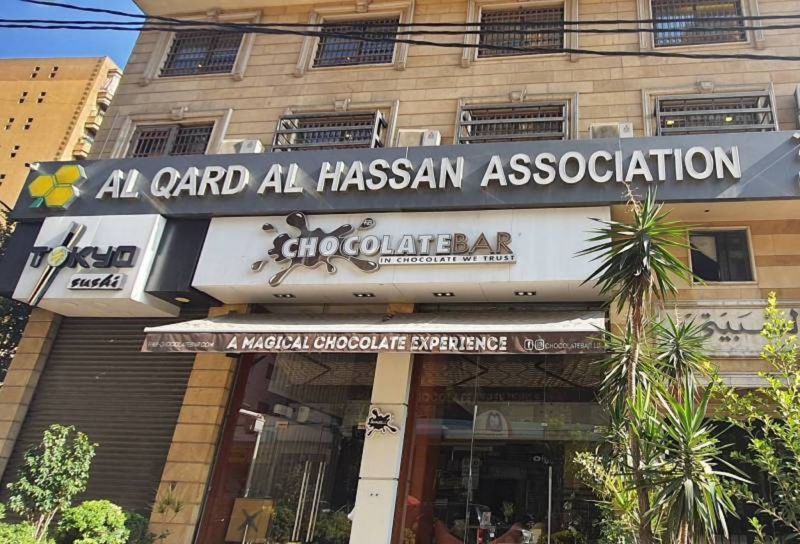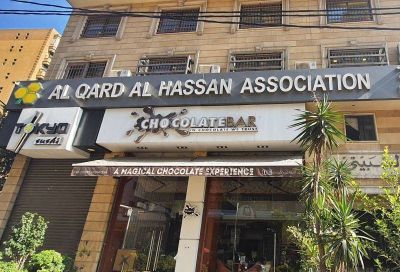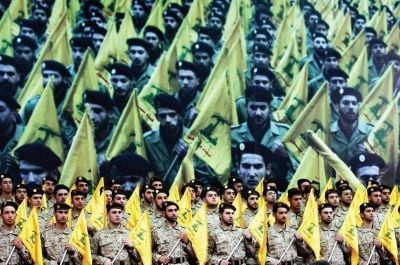
A branch of al-Qard al-Hassan in Beirut. (Credit: Stock photo ‘Le Commerce du Levant’)
A branch of al-Qard al-Hassan, Hezbollah’s microfinance company, is anticipated to open soon in a small newly constructed building in the Christian village of Souk al-Gharb in the Aley district.
Established in 1983, Al-Qard al-Hassan has been registered as a non-governmental organization since 1987. It offers microloans in dollars or lira in exchange for either a mortgage on gold jewelry or sponsorship by one of the association's financial “contributors.”
The organization currently has a significant presence in areas where Hezbollah has a large support base, operating in 31 offices across Beirut’s southern suburbs, the Bekaa and South Lebanon.
Although the idea of easily accessible microcredit may be attractive during Lebanon’s current situation of crisis and banking restrictions, news of the new branch has not been unanimously welcomed in Souk al-Gharb. Though the locality is inhabited by a considerable number of Druze, Sunni and Shiite Muslims, who have settled in the area since the end of the Civil War, the area is not under the influence of the Iranian-backed party.
Tony,* a Christian resident of Souk al-Gharb, expressed his disappointment, saying, “Unfortunately, we are confronted with a fait accompli. The municipality has granted them all the necessary authorization. I used to pass by their premises every day without even knowing what it was.”
“We have been residing here peacefully for years alongside our neighbors from different communities. However, we fear that politics may interfere from now on,” he told L'Orient-Le Jour.
Tony returned to Souk al-Gharb in 1994 with his family after leaving Kesrouan during the 1975-90 Civil War.
Riad,* a Druze shopkeeper who has been living in Souk al-Gharb for 10 years now, is skeptical about the project because “Hezbollah is designated as a terrorist group by many countries.”
“I fear that the next step will be the establishment of a party office and the presence of armed individuals in the village. Who will be able to handle such a situation?”
Riad also wondered why the organization did not opt for Keyfoun or Qmatiyah, the only two Shiite towns in the area.
Fady,* also Druze, who works in Souk al-Gharb, said he fears a scenario similar to the events of May 7, 2008, which led to a “war” with Hezbollah.
On that day, Hezbollah and gunmen affiliated with Amal and the SSNP seized control of western Beirut by force, amid a dispute over the party’s unofficial communications network. It resulted in deadly clashes between Shiites and Druze in the Chouf area.
Fady, who is 50 years old, believes that “Hezbollah aims to supplant the state and impose its policies throughout the country. It wants to undermine all institutions.”
The municipality’s response
Georges Salibi, the mayor of Souk al-Gharb municipality, defended himself against the criticism caused by the project.
He claims that the authorizations obtained by al-Qard al-Hassan are in compliance with the regulations.
“The municipality received authorizations signed by the officials concerned and, therefore, had no choice,” he told L’Orient-Le Jour.
“I could not oppose this project solely because it was initiated by Shiites,” Salibi stated. “Those who are unconvinced should seek al-Qard al-Hassan’s services in the village.”
As per a report in an-Nahar daily, a member of municipal councilors resigned Monday, expressing dissatisfaction with Hezbollah’s “takeover of his village” — information L'Orient-Le Jour could not confirm.
Hezbollah-run and presented as a “charity,” al-Qard al-Hassan collects deposits in non-interest-bearing accounts, in line with Islamic finance principles, and offers loans in dollars or lira. Though it functions like a bank, with ATMs and a mobile application to manage accounts, the institution operates outside the conventional financial system.
Considered a vital economic asset of Hezbollah, al-Qard al-Hassan has been subjected to sanctions by the US Treasury since 2007. In October 2021, Saudi Arabia also designated it as a “terrorist entity.”
Called the “bank of Hezbollah,” al-Qard al-Hassan has announced plans to open four new branches in 2023, including one in Souk al-Gharb and another recently opened in Qana (Sur district).
The locations of the two remaining branches have not yet been revealed. The expansion raises several questions in the current political and financial environment. When contacted by L'Orient-Le Jour, both Hezbollah and the director of al-Qard al-Hassan, Adel Mansour, declined to comment on the matter.
$4 billion
According to al-Aahd news site, which is close to Hezbollah, Mansour disclosed earlier this year that the company had granted 200,000 loans worth half a billion dollars in 2018 and over 150,000 loans in 2022. He claimed that 1,900,000 individuals have benefited from the structure’s assistance from its inception until 2021.
Mansour estimated that the total loans granted by this organization until 2021 amounted to $4 billion.
According to al-Aahd, al-Qard al-Hassan opened its first branch in the 1980s in Haret Hreik, a municipality south of Beirut, with just six employees.
During the July 2006 war with Israel, nearly 5,000 people’s gold deposits were damaged by Israeli strikes, but the company managed to pay back the borrowers, the site reported.
The company, which now has 500 employees, granted 20,000 loans in 2022 as part of a program to finance the installation of solar energy panels.
According to its director, 20 percent of those who have taken advantage of the solar energy loans “are not from the Shiite community.”
Al-Qard al-Hassan provides pawnbroker services to its customers — paying depositors for jewelry and other precious possessions, and holding them in trust until they have the cas to reclaim them. According to Mohanad Hage Ali, a researcher at the Carnegie Middle East Center, the economic crisis and the sharp depreciation of the national currency have resulted in many people losing the gold pawned with al-Qard al-Hassan, because they could not pay back their loans on time.
Despite concerns expressed by residents of Souk al-Gharb, Hage Ali sees al-Qard al-Hassan’s expansionist plans as “a sign of weakness” for Hezbollah.
He notes that Hezbollah is in a precarious position because it has lost its Christian cover with the Free Patriotic Movement and has no significant Sunni allies.
“Even Hezbollah supporters accuse the party of not providing sufficient assistance,” Hage Ali told L’Orient-Le Jour.
According to journalist Ali al-Amin, known for his criticism of Hezbollah, people who are not party supporters are unlikely to feel confident depositing gold in exchange for a loan from al-Qard al-Hassan.
He also sees the opening of new branches as part of a “media campaign” by Hezbollah aimed at improving its image.
Amine notes that Hezbollah’s activities are under scrutiny in Lebanon, and the party is frequently blamed for the country’s collapse while its weapons are criticized. Therefore, he believes that Hezbollah is attempting to redeem itself through its expansionist plans.
‘Embargo’
According to journalist Ali Dahi, a close associate of Hezbollah, al-Qard al-Hassan is not a bank and does not conduct banking or foreign exchange operations. Nor does it have a political agenda.
He told L’Orient-Le Jour that the organization’s expansion is aimed at “providing social and humanitarian aid to more than 100,000 people per year, within its financial means.”
Dahi added that the company’s financial capital comes from “deposits of Lebanese contributors, associations, donors, and businessmen.”
He denounced a “campaign” against al-Qard al-Hassan orchestrated by the “Saudi-American system” and described the institution as a “humanitarian association.”
Dahi believes that the controversy is due to the fact that the association depends on “Hezbollah and that there is a political problem with the party’s arms and national resistance project.”
Returning to the uproar caused by the inhabitants of Souk al-Gharb, Dahi wondered whether “it is now forbidden for Shiites to work in Druze or Christian areas, and vice versa.”
“Are we now living in a federation?” he asked.
When contacted by L’Orient-Le Jour, Hezbollah analyst Kassem Kassir said that “the campaign against al-Qard al-Hassan is unfounded.”
“This association has saved Lebanese [people] from several crises,” he added, “but unfortunately, some do not accept the success of a Lebanese enterprise and want to contribute to the embargo imposed on the Lebanese.”
*Names have been changed at the request of the interviewees.
This story originally ran in French in L'Orient-Le-Jour, Translated by Sahar Ghoussoub.

